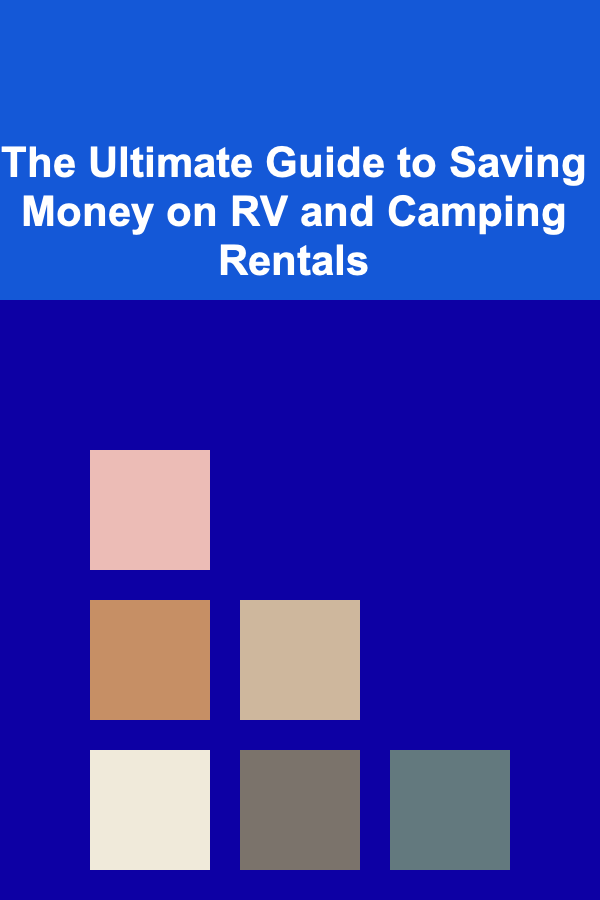
The Ultimate Guide to Saving Money on RV and Camping Rentals
ebook include PDF & Audio bundle (Micro Guide)
$12.99$10.99
Limited Time Offer! Order within the next:

Renting an RV or camping gear can be a fantastic way to experience the great outdoors without the long-term commitment of owning your own equipment. Whether you're embarking on a cross-country road trip or planning a weekend getaway, renting an RV or camping gear offers flexibility, comfort, and convenience. However, as with any rental, costs can add up quickly. The good news is that with a little planning, research, and strategy, you can save significant amounts of money on RV and camping rentals. This actionable guide will walk you through practical tips and tricks to help you reduce your rental expenses while still having an amazing outdoor experience.
Plan Ahead to Avoid Peak Season
The timing of your rental can significantly impact the price. Much like booking flights and accommodations, rental prices for RVs and camping gear can vary greatly depending on the time of year.
Key Factors:
- Peak Season: Rental rates for RVs and camping gear tend to be higher during peak seasons, including holidays, summer months, and long weekends. This is when demand is the highest, and rental companies charge a premium.
- Off-Peak Season: The best time to secure lower rates is during the off-peak season, typically in early spring or fall. Demand is lower, and rental companies are more likely to offer discounts or promotions to attract customers during these slower times.
To save money, plan your trip during the off-season. If possible, avoid major holidays and summer months when prices are at their peak.
Tip:
Many RV rental companies offer early bird discounts for those who book well in advance. Try to book your RV or camping gear several months ahead of time to lock in the best rates.
Compare Multiple Rental Providers
Just as you would compare hotels or car rentals, it's essential to shop around for the best deal when renting an RV or camping gear. There are numerous rental companies out there, each offering a different set of prices, policies, and additional services.
Actions to Take:
- Research Different Companies: Start by looking at several RV rental agencies, both large and small. Don't forget to check peer-to-peer rental platforms (like Outdoorsy and RVshare) where individuals rent out their personal RVs.
- Check for Hidden Fees: Make sure you carefully review the terms and conditions of the rental agreement. Some rental companies advertise low daily rates but may charge hidden fees for mileage, insurance, cleaning, or deposits. These fees can quickly add up, so look for a company that includes these extras in their quoted price or offers them at a reasonable rate.
- Special Discounts: Look for any discounts that may apply to your situation, such as membership benefits (AAA, AARP, military discounts) or loyalty programs.
Tip:
Some rental companies offer price matching or will negotiate rates, especially if you book early. If you find a better deal at a competitor, reach out and ask if they can match or beat it.
Understand the Rental Terms and Conditions
When renting an RV or camping gear, the terms and conditions are crucial. Being aware of what is included in your rental and what additional costs may arise can help you avoid unexpected expenses.
Consider the Following:
- Mileage Limits: Many RV rentals come with a set number of miles per day or per rental period. Exceeding this limit can incur additional costs. Be mindful of your trip's route and try to estimate how many miles you'll be driving to avoid overage charges.
- Insurance Options: Check if insurance is included or if it's an additional cost. Some RV rental companies require you to purchase their insurance package, while others allow you to use your own insurance. Make sure you understand the coverage provided and the total cost of insurance before agreeing to the rental.
- Fuel Policy: RVs and camping vehicles often come with specific fuel policies, such as "full-to-full" or "empty-to-empty." Understand how the fuel policy works so you can plan for the cost of refueling the vehicle.
- Cleaning Fees: Some rental agencies charge cleaning fees, while others provide a cleaning kit for you to clean the RV yourself before returning it. If the latter option is available, cleaning the RV yourself can save you the cleaning fee.
Tip:
If you have a large group, consider splitting the cost of mileage, insurance, and fuel to make the trip more affordable for everyone involved.
Look for Bundle Deals
One way to save money on RV and camping rentals is to look for bundle deals. Many RV rental agencies offer discounts for customers who rent additional equipment or book extended rental periods.
Consider These Bundles:
- Campground Packages: Some RV rental companies partner with campgrounds and offer bundle deals that include both the RV rental and campground fees. These packages can sometimes offer significant savings compared to booking separately.
- Camping Gear Rentals: If you're not renting an RV but rather camping gear, check if the company offers bundle deals on gear like tents, sleeping bags, cooking equipment, and coolers. Renting all your gear from one company can often be cheaper than renting each item individually.
Tip:
Look for deals that include necessary items like a GPS, kitchen equipment, and bedding, so you don't have to rent them separately from other providers.
Rent from Local Owners
In addition to traditional RV rental companies, many platforms like Outdoorsy and RVshare offer peer-to-peer RV rentals, where individual RV owners rent out their personal vehicles. This option can often be more affordable, as private owners may charge less than commercial rental companies.
Why It's Cost-Effective:
- Lower Overhead Costs: Private owners don't have the same overhead expenses as larger companies, which can lead to more competitive rates.
- Customization and Flexibility: Many RV owners are willing to negotiate on price and rental terms, which gives you the flexibility to tailor the rental to your specific needs.
- Access to a Wide Range of RVs: You may find unique or specialized RVs that better suit your budget and trip style, whether you're looking for a small camper van or a luxurious motorhome.
Tip:
Be sure to check the reviews and ratings of the RV owner before booking to ensure the vehicle is well-maintained and the owner is reliable.
Consider the Size and Type of RV
The size and type of RV you choose will have a direct impact on the price. While larger RVs may offer more comfort and space, they also come with higher rental costs. Smaller, more compact RVs are generally more affordable and are suitable for couples or small families.
Factors to Keep in Mind:
- Compact vs. Full-Size RVs: A compact RV or camper van may be significantly cheaper than a full-sized motorhome. If you're planning a short trip or don't need a lot of space, opting for a smaller RV could save you money.
- Class A vs. Class C RVs: Class A RVs are the largest and most expensive, while Class C RVs are smaller and more budget-friendly. Class B vans (camper vans) are another good option if you're looking for something more affordable and easier to drive.
Tip:
Rent an RV that matches the size of your group. Renting a massive RV for a solo trip or for a couple might be unnecessary and costly. Stick to what you need.
Minimize Additional Costs
There are several strategies you can use to minimize extra expenses associated with RV and camping rentals. By being proactive, you can avoid unnecessary charges and keep your budget under control.
Helpful Tips:
- Pack Light: Avoid paying extra fees for bringing excess luggage or gear. Only bring what you need, and utilize the RV's storage space efficiently.
- Cook Your Own Meals: Eating out can quickly add up, especially in touristy areas. Save money by cooking meals inside the RV or at the campsite. Most RVs come with kitchenettes, and campgrounds often have picnic tables and grilling areas.
- Use Free Campgrounds: Look for free or low-cost campgrounds instead of expensive resort-style campsites. Many national forests and Bureau of Land Management (BLM) lands offer free camping options.
Tip:
Consider using apps or websites that help you find free or low-cost campgrounds, such as Campendium or FreeCampsites.net.
Book Longer Rentals for Discounts
Many RV rental companies offer discounts for longer rental periods. If you're planning a multi-week trip, you may qualify for reduced rates, making a longer rental more affordable on a per-day basis.
How It Works:
- Weekly and Monthly Discounts: Renting for a week or more may result in a significant discount compared to daily rental rates. The longer you rent, the cheaper it can be per day.
- Extended Trips: If you're considering a long-term RV adventure, see if rental companies offer deals on month-long rentals, which may come with additional perks, such as free mileage or waived fees.
Tip:
If you're on the fence about the length of your trip, consider booking a longer rental and adjusting the itinerary later. You may find that the cost per day decreases as the length of the rental increases.
Conclusion
Renting an RV or camping gear can be an affordable way to enjoy the outdoors, but costs can quickly spiral out of control if you're not careful. By planning ahead, comparing rental providers, understanding the terms and conditions, and being strategic about your rental choices, you can save money while still enjoying the adventure of a lifetime. Keep these tips in mind, and you'll be well on your way to a more budget-friendly and memorable outdoor experience.

How to Find the Best Affordable Options for Home Insurance: An Actionable Guide
Read More
How to Make Family Time Special with DIY Board Games
Read More
How to Make Money Online as an Archaeologist: 10 Actionable Ideas
Read More
How to Organize Personal Mementos by Theme
Read More
How to Master Options Spreads
Read More
How to Create an Insect Care Checklist for Beginners
Read MoreOther Products

How to Find the Best Affordable Options for Home Insurance: An Actionable Guide
Read More
How to Make Family Time Special with DIY Board Games
Read More
How to Make Money Online as an Archaeologist: 10 Actionable Ideas
Read More
How to Organize Personal Mementos by Theme
Read More
How to Master Options Spreads
Read More